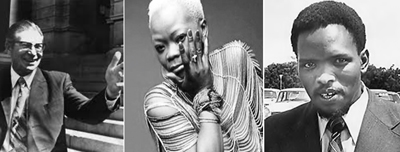Latest News Archive
Please select Category, Year, and then Month to display items
![]()
The composition of the Council of the University of the Free State is stipulated in the UFS Statute, as promulgated in the Government Gazette of 26 January 2018. The terms of office of the President of Convocation, Prof Johan Grobbelaar, Christo Dippenaar, Henry Madlala (Qwaqwa Campus) expire on 31 October 2018. Convocation has to appoint three representatives in their place, one of which has to be the President of Convocation and another should be from the Qwaqwa Campus. In terms of the Statute, both Dippenaar and Madlala are eligible for re-election.
Written nominations for the election of three representatives of the Convocation for a period of four years, are hereby requested.
The Convocation comprises of all permanent academic staff from lecturer to professor, all permanent staff other than academic staff from Deputy Director to Rector and Vice-Chancellor by virtue of their respective offices and all students (current and former) who obtained a qualification at the university.
Each nomination shall be signed by five members of Convocation and shall contain the written acceptance of the nomination by the nominee under his or her signature, as well as an abridged CV (±2pages). These must reach Dawid Kriel by 12:00 on Monday 12 November 2018. If more than one person per each of the three categories is nominated, elections will be held on or before Friday 16 November 2018. You will be notified of the final date for elections in due course. Please submit your nomination via:
• E-mail: dawid@ufs.ac.za
• Fax: 086 643 1665
• Post: Dawid Kriel University of the Free State: Institutional Advancement PO Box 339 Bloemfontein 9300
• Hand delivered at: Dawid Kriel, Room 26, 1st Floor, Wekkie Saayman Building, Bloemfontein Campus
For enquiries, please contact Claudine Taylor at TaylorCL@ufs.ac.za or +27 51 401 2097.
Click here for the nominations form.
Understanding the nature of prominence
2014-03-14
|
 |
What did Hendrik Verwoerd and Steve Biko have in common? Or perhaps Johannes Kerkorrel and Brenda Fassie?
“They all possessed a certain natural predisposition to prominence,” says Prof Paul Fouche, reseacher in psychobiography at the University of the Free State’s Department of Psychology.
Prof Fouche and a team of researchers from other South African universities released findings on psychobiographical studies done on personalities that played a great role in our history.
The studies show that notable historical figures were very often prolific readers with a passion for literature since childhood. Generally, they also had a great love for nature and a sense of the sacredness of it, as well as a love for the cosmos.
The study further reveals that many of them were forced to take up leadership roles in the family from a very young age and were driven to succeed in order to take care of their own.
In many of these cases, there was a strong partner who supported the leader while they went about the business of governing their world.
Psychobiography is the systematic and descriptively-rich case study of renowned, enigmatic or even contentious individuals in socio-historical contexts within a psychological frame of reference. Over the past decade, psychobiography has become an established research genre and a methodology used by various academics and scholars in the field of life history research.